The Fourth Crusade: the Papacy, Byzantium and Venice
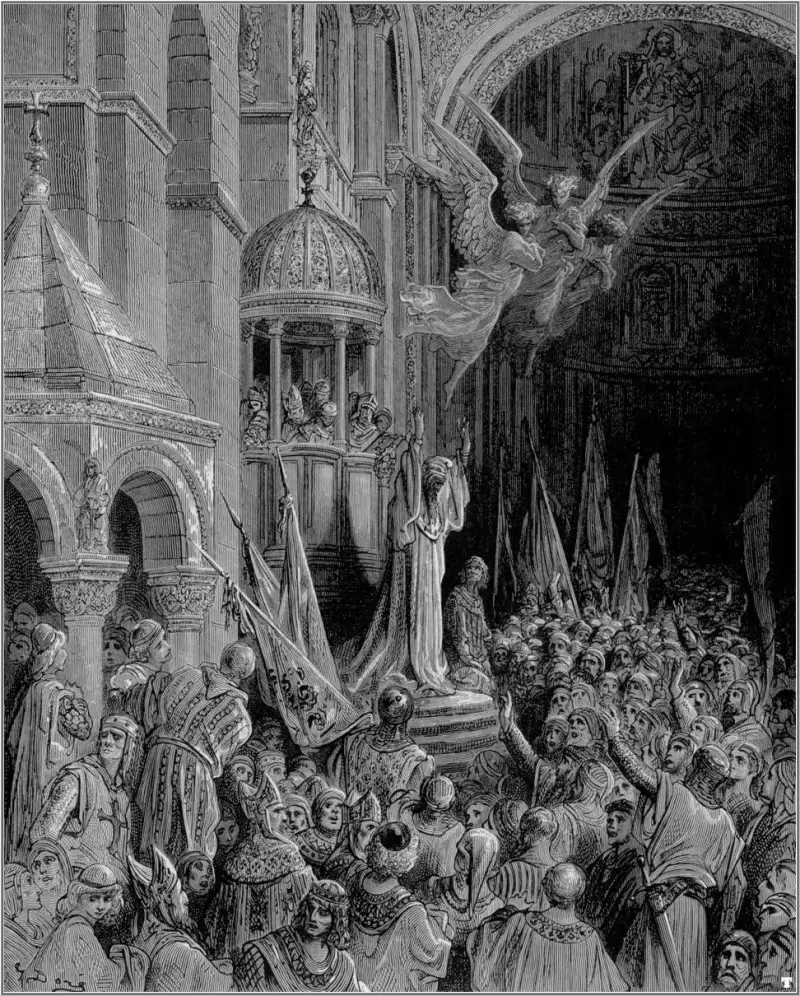
Gustave Dore. Enrico Dandolo blesses the knights
"Vicar of God" Innocent III
In 1198, Pope Celestine III died, and the cardinals elected Lotario de Conti to the papal throne. He became Pope Innocent III (1198-1216). His reign led to the greatest flowering of papal power. This Italian aristocrat was a talented diplomat and manager. The Pope, with rare skill and tenacity, achieved his goals, using the weaknesses of his opponents to strengthen Rome.
At that time he was only thirty-seven years old. Usually, very old men who did not live long and valued peace were chosen as popes. De Conti received an excellent education: he studied theology at the University of Paris, canon law at the University of Bologna. He fanatically believed that the papal throne should rule the entire world. He steadily and consistently pursued a policy aimed at ensuring that the “vicar of God” ruled the whole world. As a result, he became the most powerful ruler of Europe.
Innocent strengthened his power in Central Italy, expanded the Papal States, and ousted the German feudal lords from the country. With skillful maneuvers he separated the rich trading cities of Italy. The pope became the guardian of the young king of Sicily, Frederick (the son of the German king and emperor Henry). The Pope became the overlord of a number of kings. The Kingdom of Sicily, Sweden and Denmark became vassals of the pope. Portugal renewed its feudal oath. Aragon and Poland then became papal vassals. The kings of Serbia and Bulgaria sought support for the papal throne, in return promising union with the Catholic Church. Even distant Armenia recognized its dependence on Rome.
Innocent played a skillful game against Germany, trying to subjugate the Holy Roman Empire. He exploited the struggle for the imperial throne between the house of the South German kings of Hohenstaufen (Staufen) and the house of Welf. Due to the infancy of Frederick of Sicily, great turmoil began in the empire: supporters of the Hohenstaufens elected Henry's brother, Philip of Swabia, as king, and supporters of the Welfs elected Otto of Brunswick. King Philip II Augustus of France supported Philip's demands, while King Richard I the Lionheart supported his nephew Otto.
In 1201, the pope openly supported Otto IV. In 1209, Philip died, and the pope crowned Otto as Holy Roman Emperor. After this, Otto abandoned his previous promises and set his sights on restoring imperial power in Italy and even Sicily. In November 1210, the pope excommunicated Otto IV because he occupied the Romagna and decided to attack the Kingdom of Naples. In 1212, the pope appointed his opponent Frederick, King of Naples, emperor. Otto was defeated by the French in 1214 and soon lost all influence. Frederick became emperor.
Innocent was a flexible politician who did not disdain any means or methods. He intimidated some with heavenly and earthly punishments, bribed others with flattery and illusory hopes, and with others he entered into secret agreements that could contradict the official policy of Rome.
The Pope used the struggle between the Capetians and Plantagenets to subjugate England. Innocent came into conflict with King John the Landless, in 1208 he imposed an interdict on England (a temporary ban on all church activities and requirements) and in 1209 he deposed John. In 1213, John recognized England as a vassal of the Pope. At the same time, Innocent was unable to subjugate the proud and equally cunning French king Philip. But he put pressure on him through the divorce proceedings.
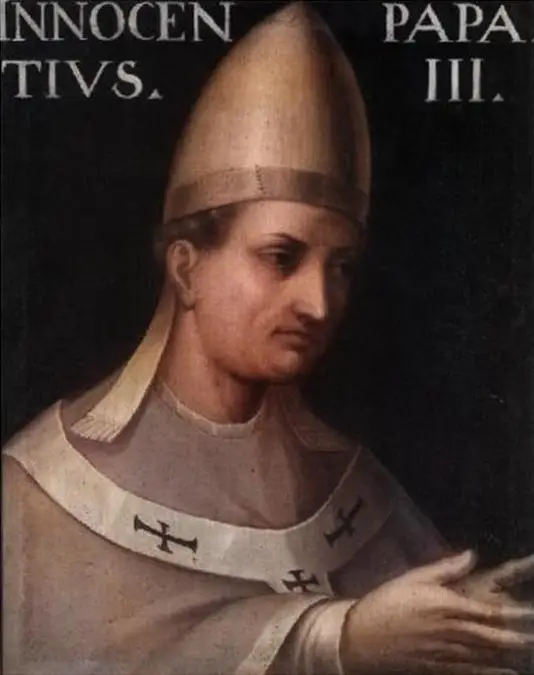
Innocent III
Organization of the Fourth Crusade
One of the most important policy instruments of Innocent III was the crusades against the “infidel” Muslims, against the “pagans” (Baltic and Slavic tribes of Eastern Europe), as well as against the “heretics” who refused to recognize the authority of the pope. Monetary collections, which were carried out under the pious pretext of fighting the “infidels,” enriched the pope’s treasury and were used to influence large feudal lords.
The real goal of the Crusades was the destruction of the enemies of the Roman “vicar of God” and the subjugation of new peoples and regions to Rome.
Innocent decreed the beginning of the Fourth Crusade in 1198, planning to regain control of the Holy Land. Most of his pontificate was devoted to preparing this campaign. Unlike his predecessors, Innocent III showed personal involvement in organizing the campaign. Special missionaries were sent to the Catholic monarchs. The Pope achieved a truce between England and France. Innocent decided to start raising funds, which none of his predecessors had done. He forced the entire clergy under his leadership to give 1/40 of their income in support of the crusade. This was the first time a direct tax was introduced on clergy. The French and English kings promised the same share of their income.
The Roman Curia at this time became a powerful financial force in the West. Extorting funds from all over the Catholic world, robbing “infidels” and “schismatics”, the papacy is establishing close ties with the banking houses of various European countries. Combining financial priority with the brute force of the “knights of the cross” and a monopoly on knowledge, Rome became the “control center” of European civilization, laying claim to global-universal power.
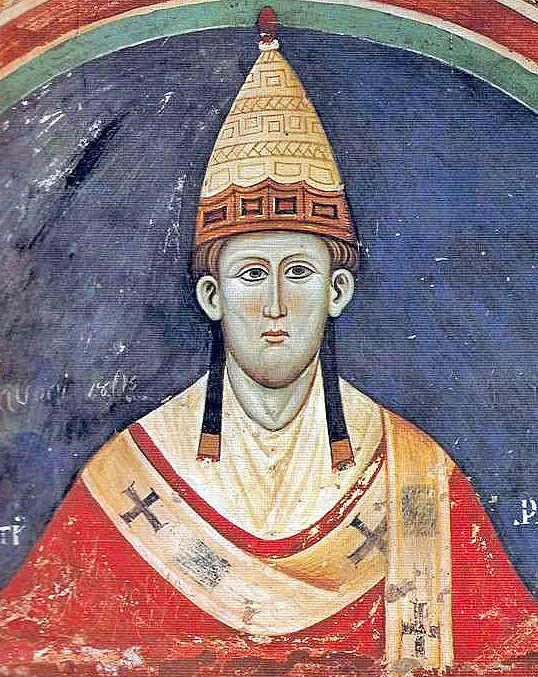
Innocent III. Pope from January 8, 1198 to July 16, 1216
The position of Byzantium and the approach of disaster
In the church life of the empire, on the one hand, the emperors, who considered themselves (like the popes) both temporal and spiritual rulers, fought against heresies and false teachings that worried the minds of both ordinary people and nobles. On the other hand, the threat from the Turks and Pechenegs, from the crusaders, began to threaten the very existence of Byzantium as a state and forced the basileus emperors to seriously think about a union with the Catholic Church. This led to a split in society. Latinophiles and their opponents, the Patriotic Party, appeared.
By the beginning of the 13th century, the economy of the empire (the basis of its military power) was undermined by the trade expansion of the Italian republics: Venice, Genoa and Pisa. Venice took first place. Not only in the capital, but also in many provincial cities and islands, the Venetians, Pisans and Genoese had great privileges and rights, their own quarters. The Italians took over the empire's trade into their own hands, taking its previous income.
As a result of the Crusades, Byzantium lost its monopoly position as a mediator between the West and the East. The West and the East established direct trade ties with each other.
Economic degradation and theft led to the complete decline of the military fleet. Huge amounts of money had to be spent on the army to hold back the onslaught of neighbors. The army consisted of a local element, which was fielded by themes (the military-administrative district of the Byzantine Empire), and a newcomer - numerous mercenary detachments.
In the east, the Seljuks tore into pieces of the empire's possessions, in the south, in the Danube valley, the Pechenegs carried out devastating raids, and from the west, the South Italian Normans attacked. Then a new threat appeared from the West - the Crusaders. Bulgaria and Serbia separated from the empire.
The population of the empire decreased due to endless unsuccessful wars and ruinous raids, which led to a fall in taxes and treasury revenues. Some areas in Asia Minor were abandoned due to constant raids by Muslim rulers. Part of the population was taken into slavery, while others fled to calmer and richer coastal cities. The remaining population could not bear the same tax burden. A similar situation was in the Balkans, where people fled due to attacks by the Pechenegs, Hungarians and Serbs.
At the same time, a lot of money was wasted, in particular, on the insane luxury of the imperial court, the maintenance of favorites and favorites. Corruption and bribery flourished at court.
Many large land holdings, both spiritual and secular, were exempt from taxes; the entire burden of taxation fell on the common people. People were exhausted from the unbearable burden of taxes. The tax collectors were hated by the entire country, which led to a series of riots.
The Byzantine monarchy ceded its power and wealth to the aristocracy. In connection with the increase in large land holdings, there is a strengthening of the power of large feudal lords, who became less and less dependent on the central authorities. The process of feudalization of the country is rapidly progressing. The separatism of provincial rulers and feudal fragmentation intensified. The Valilevs had to fight internal conspirators. At the same time, the emperors dreamed of restoring their power over Italy, considering themselves the true heirs of Ancient Rome. The influence of the trading cosmopolitan elite of the big cities of the empire, which did not care about national interests, grew. Only personal interests, wallet.
Constantinople was the real capital of the West and the East - according to various estimates, its population numbered at the end of the 800th century. from 1 thousand to XNUMX million people. A real metropolis. International Babylon of that era - Greeks, Slavs, Jews, Armenians, Rus, Germans, Turks, Arabs, mercenaries and traders of all peoples and tribes. And other trading cities of the empire, in comparison with the poor, dirty and small cities of Western Europe, shone with the remnants of their former luxury and wealth. For the predatory crusaders, this was a huge booty.
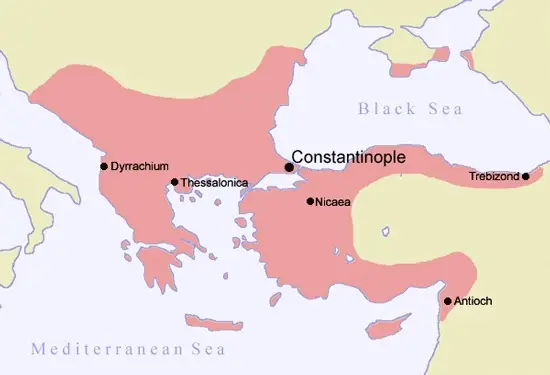
Byzantine Empire in 1180
Crusade and Byzantium
Pope Innocent III negotiated with Basileus Alexios III Angelos (reigned 1195-1203) about union. Angels is the name of the dynasty. The first emperor from the line of Angels was Isaac II Angel (1185-1195), who overthrew Basileus Andronikos I Komnenos, his animals tortured and killed. In 1195, during a campaign against the Bulgarians, the cruel basileus was overthrown by his brother, Alexei. Isaac was blinded and thrown into prison. The subjects of Emperor Alexei gave their ruler the mocking nickname “Having a cotton rod” - Bambakorabdus, so he was a weak-willed, worthless manager).
Negotiations between the pope and the basileus dragged on. Irritated, Innocent began to threaten Alexei that he would support the family of the deposed Isaac in the rights to the Byzantine throne. Having blinded his younger brother, Alexei III Angel spared his son Alexei. The nephew lived in Constantinople, but fled from there in March 1202. After leaving his homeland, Angel went to Germany, whose king Philip of Swabia was married to his sister Angelina. The Byzantine emperor did not agree to the union, and in one of his letters he stated that his power was higher than spiritual. Therefore, relations between Rome and Constantinople were cold.
Without ceasing to negotiate with Constantinople and the political game in Germany, the pope showed vigorous activity in organizing the fourth crusade. This time, none of the major European sovereigns responded to Rome's call. The French king Philip II was in conflict with the papal throne due to a divorce from his wife. The English King John, who had just taken the throne, waged a stubborn struggle with the barons. In Germany there was a difficult struggle between the Staufens and the Welfs.
But the flower of French chivalry, especially from Northern France, set off on the campaign. The pope's call was answered by Count of Champagne Thibault (Theobald), nephew of Philip II Augustus and Richard the Lionheart, Count of Flanders Baldwin, Margrave of Montferrat (Italy) Boniface I, Count of Blois Louis, Duke of Burgundy Ed (Odo) and others. The crusader army included the French, Flemings, English, Germans, and Sicilians.
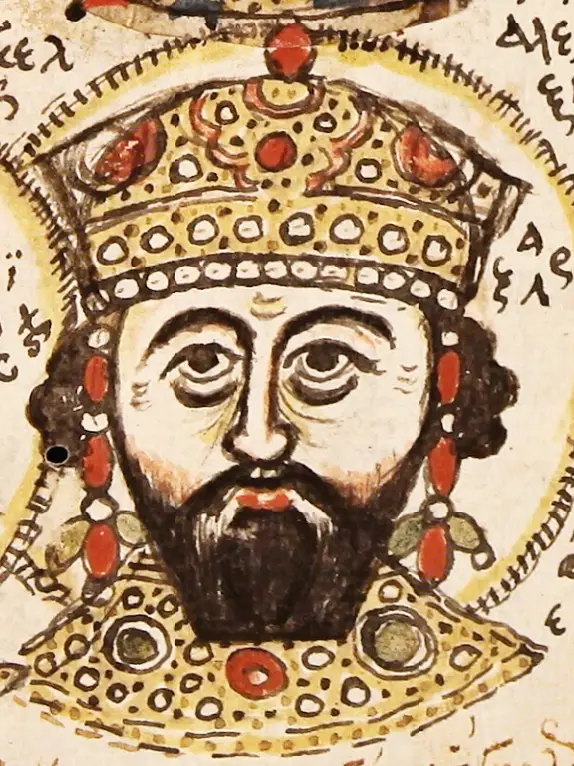
Image of Alexei III Angel
The role of Venice
The main figure of the crusade was the Venetian Doge (elected ruler of the Venetian Republic) Enrico Dandolo. Despite his venerable age, at the time of his accession to the throne in 1192 he was over 80 years old (born in 1107 or 1108), he was full of energy and in every possible way defended the strategic, mainly in the economic sphere, interests of the Republic of St. Brand. Dandolo was a skilled politician and trader who did not skimp on his means. He knew how to work with people, had great restraint and caution.
Previously, Venice was part of the Eastern Roman Empire and for a long time remained under the formal authority of the Byzantine basileus. The Republic of Venice, skillfully taking advantage of its advantageous and secure position between the Byzantine Empire and the Western kingdoms, developed its prosperity and became a rich and powerful trading city. Its fleets, together with Byzantium, successfully fought against the Normans and Saracens in southern Italy, and against the Slavs in the Balkans. The Venetians controlled the Adriatic Sea and colonized the Western Balkans. They subjugated Istria and the trading cities of Dalmatia.
Under the conditions of the Crusades, Venice began to press out its former overlord, Byzantium, and seized its trade. Relations between Venice and Byzantium were not particularly friendly. The Greeks hated the successful Venetians. Legend tells that in 1171-1172, when the authorities of the Byzantine Empire captured and imprisoned thousands of Venetians, Dandolo was sent as ambassador to Second Rome. There, the basileus Manuel Komnenos, by cunning, blinded Dandolo in one eye. This was supposedly the reason for the Doge’s deep hatred of the Romans (as the population of Byzantium was called).
Of course, the reasons for the rivalry were much deeper. The East - both Christian and Muslim - was a powerful source of wealth. Byzantium was Venice's main competitor in the struggle for this wealth. Dandolo demanded that the Greeks return all their previous trading privileges, rights that were curtailed under the last emperors from the Komnenos dynasty. Also, the Doge could not come to terms with the fact that after Venice’s long trade monopoly in Byzantium, the Greeks began to give trade privileges to other Italian cities - Genoa and Pisa. This undermined the trade of the Republic of St. Brand.
In the mind of the cunning and far-sighted Doge, a plan is brewing to conquer Byzantium in order to gain control over the main market of the East. Dandolo began to threaten Emperor Alexei with support for the rights to the throne of the family of Isaac's deposed brother Angel.

Portrait of Enrico Dandolo. Hood. Giulio Carlini
Thus, the main role in organizing the campaign was played by two people: Pope Innocent, carried away by the thought of a church union, which would give him power over new peoples and countries, and Doge Dandolo, who put the trade and material interests of Venice first. Then the Byzantine prince Alexei, the son of the deposed Isaac Angel, who fled to the West, also played his role. And the German king Philip of Swabia, married to the daughter of the same Isaac Angel, sister of Tsarevich Alexei.
Thibault Champagne, whom the warriors loved, was chosen as the head of the campaign, and he became, as it were, the soul of the campaign. But, to everyone’s grief, he died in 1201. The crusaders chose a new leader - Boniface of Montferrat. During the crusade, Boniface kept himself in the shadow of the Venetian Doge. The leading role in the campaign passed from the French to the Italians.

Boniface was elected leader of the Soissons Crusade in 1201. Hood. Henri Decayne
To be continued ...
Information